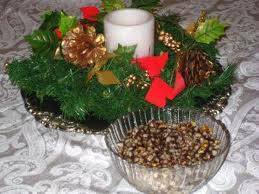
Members of the family gather around the table and the meal begins with the Lord’s prayer .The first and indispensable dish is kutya, a preparation of cooked wheat dressed with honey, ground poppy seed, and sometimes chopped nuts. This ritual dish, of a very ancient origin, has survived hundreds of generations without losing its importance in the Christmas festivity. it starts the meal in a ceremonial manner.The head of the family raises the first spoonful of the kutya, invoking God’s grace, and greets the family with the traditional Christmas greet: “Khrystos Rodyvsya” (Christ is born), to which they all reply in unison: “Slavim Yoho!” (Let us glorify Him). Following this ritual everyone must partake of the kutya, if only but a spoonful. The exact meaning of kutya has been lost. However scholars of the folklore generally believe that originally it symbolized the spiritual clan unity of all living and deceased members. Agricultural prosperity may have been a secondary symbol.
Kutya may be followed with an appetizer of pickled herrings or pickled mushrooms, or with a serving of borsch, after which comes one or more preparations of fish and various other traditional dishes, ending with a dessert of stewed dried fruit, or fruit varenyky, and the Christmas pastries and nuts. Everyone must have at least a small serving of each dish.
After the solemn meal, the family joins in singing Christmas carols and general merry-making. There is no visiting on Christmas Eve with the exception of bringing Yuletide greetings and some of the supper dishes and pastries to the grandparents. It is strictly a family evening. There are many beliefs and superstitions connected with the Christmas Eve celebration which are no longer observed.
Soon after midnight or at early dawn, the family attends a special Christmas service enriched with beautiful choral music. In the afternoon of the Christmas Day, continuing late into the night and through the following days, organized groups of carolers visit homes, singing ancient and modern carols, bringing traditional Yuletide greetings, and soliciting funds for worthly causes.
Kutya may be followed with an appetizer of pickled herrings or pickled mushrooms, or with a serving of borsch, after which comes one or more preparations of fish and various other traditional dishes, ending with a dessert of stewed dried fruit, or fruit varenyky, and the Christmas pastries and nuts. Everyone must have at least a small serving of each dish.
After the solemn meal, the family joins in singing Christmas carols and general merry-making. There is no visiting on Christmas Eve with the exception of bringing Yuletide greetings and some of the supper dishes and pastries to the grandparents. It is strictly a family evening. There are many beliefs and superstitions connected with the Christmas Eve celebration which are no longer observed.
Soon after midnight or at early dawn, the family attends a special Christmas service enriched with beautiful choral music. In the afternoon of the Christmas Day, continuing late into the night and through the following days, organized groups of carolers visit homes, singing ancient and modern carols, bringing traditional Yuletide greetings, and soliciting funds for worthly causes.
C H R I S T M A S E V E




